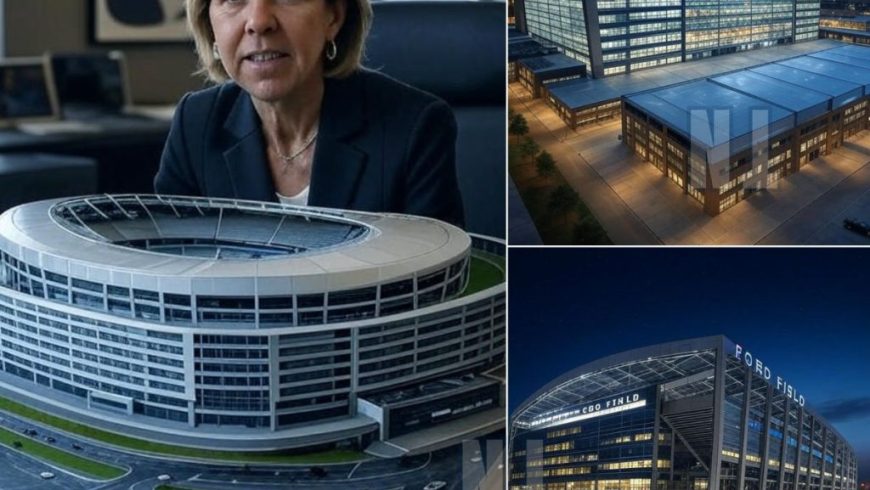In a historic announcement that sent shockwaves through the sports world, the Detroit Lions have unveiled plans for a jaw-dropping, $6.5 billion renovation to their home stadium, Ford Field. This unprecedented project promises not only to redefine the NFL game day experience but also to set a new gold standard across the football landscape — from the professional gridiron to the heart of college football Saturdays.
What the Lions revealed goes far beyond a typical stadium facelift. With a combination of cutting-edge technology, expanded seating capacity, state-of-the-art amenities, and luxury suites that rival five-star hotels, Ford Field’s renovation reflects a bold vision: making Detroit the epicenter of world-class football entertainment.
A Vision Years in the Making
Rumors of a potential Ford Field overhaul have been circulating for years, especially as other NFL franchises have invested heavily in futuristic venues. Yet, few anticipated the sheer magnitude of what the Lions ownership, led by principal owner Sheila Hamp, announced.
“This isn’t just a renovation; it’s a reinvention,” Hamp stated during a press conference packed with media, city officials, NFL executives, and football legends. “We’re not just building a better stadium for the Lions. We’re building a world-class venue that honors Detroit, energizes our fans, and raises the bar for football stadiums everywhere.”
At a staggering $6.5 billion price tag, the Ford Field project is now the most expensive stadium renovation in NFL history, dwarfing recent efforts by teams like the Rams and Raiders. But for Detroit, a city known for resilience, innovation, and a blue-collar spirit, the investment represents more than just luxury — it symbolizes belief in the Lions, their fans, and the future of football in the Motor City.
Transforming the Game Day Experience
Perhaps the most headline-grabbing aspect of the renovation is its technological overhaul. The Lions promise Ford Field will become the most digitally connected stadium in the world, with 8K ultra-high-definition screens spanning end zones, real-time interactive fan apps, enhanced Wi-Fi connectivity for 80,000+ fans, and virtual reality zones for pregame and halftime entertainment.
An entirely new sound system with immersive 360-degree audio aims to create a concert-like atmosphere during games, ensuring fans feel the roar of the Lions in their bones. Advanced lighting and retractable roof features will allow the stadium to adapt to any event, season, or weather condition.
For players, state-of-the-art locker rooms, training facilities, and recovery centers will rival those found at global sporting icons like Real Madrid’s Santiago Bernabéu or the New York Yankees’ clubhouse. The Lions say these player-centric upgrades will be a major asset in attracting top free agents and developing homegrown talent.
Luxury Meets Accessibility
While the renovation boasts elite luxury offerings, the Lions emphasize that inclusivity remains a core priority. Expanded seating will increase Ford Field’s capacity to over 85,000 — up from its current 65,000 — making it the largest enclosed stadium in the NFL.
The expanded capacity isn’t just about numbers; it’s about creating an unrivaled atmosphere. Imagine sold-out Lions playoff games with 85,000 voices echoing through the rafters — an intimidating cauldron for opponents, a dream come true for the long-suffering but fiercely loyal Detroit fan base.
At the same time, the project introduces nearly 400 new luxury suites, VIP lounges, and club seating areas that rival the finest entertainment venues in the world. Guests will enjoy gourmet dining, private bars, concierge services, and unparalleled views of the field, all wrapped in sleek, modern architecture infused with Detroit’s rich industrial heritage.
Yet, the Lions are equally proud of their plans to enhance affordability and accessibility. More family seating sections, expanded standing-room areas, and upgraded public transportation links will ensure that Ford Field remains a stadium for every Detroit fan — not just corporate executives.
Economic Impact for Detroit
Beyond the football field, the $6.5 billion investment is expected to deliver a major economic jolt to downtown Detroit. Construction alone is projected to create over 20,000 jobs, with the long-term operation of the renovated stadium generating billions in revenue for local businesses, hotels, restaurants, and transportation services.
“This is more than a sports venue; it’s a catalyst for Detroit’s continued comeback,” said Detroit Mayor Mike Duggan. “Ford Field’s transformation will attract global events, boost tourism, and solidify Detroit’s status as one of America’s great sports cities.”
Indeed, the Lions’ upgraded stadium is designed with versatility in mind. Concerts, Super Bowls, Final Fours, college football playoffs, international soccer matches, esports championships, and mega-events of every stripe are all expected to find a home in the new Ford Field.
Already, speculation is swirling that Detroit could host the College Football Playoff National Championship or even a future Summer Olympics opening ceremony within the next decade.
Setting the New Standard for College Football
One of the most intriguing aspects of the Lions’ announcement is how the renovation will directly impact college football. Ford Field has long been home to marquee college events like the MAC Championship and various neutral-site games. But with the new facilities, Detroit is poised to become a hub for the sport at its highest levels.
Expanded seating, advanced broadcast capabilities, and player-first infrastructure make Ford Field an ideal site for future College Football Playoff semifinals or championships, Big Ten showdowns, and high-profile non-conference battles.
In a statement, Big Ten Commissioner Tony Petitti praised the Lions’ ambition: “What Detroit and the Lions are building is unprecedented. The new Ford Field offers a football experience unlike any other. We expect this venue to become a cornerstone of major college football events for years to come.”
Already, negotiations are underway to bring annual top-10 college clashes to Detroit, with teams like Michigan, Michigan State, Notre Dame, Ohio State, Alabama, and Georgia rumored to be part of discussions for neutral-site games that could fill the newly expanded stadium.
Lions Send a Message to the NFL
For the Detroit Lions, this project is more than infrastructure — it’s a statement of intent. After decades of struggles, heartbreak, and unfulfilled potential, the Lions have turned a corner on the field under head coach Dan Campbell and GM Brad Holmes. With a playoff run in recent memory and a roster filled with young stars, Detroit’s future looks brighter than ever.
The Ford Field renovation reflects that optimism. It signals that the Lions are here to compete at the highest level — on and off the field — and that Detroit is ready to host the football world on its biggest stages.
NFL Commissioner Roger Goodell, present at the announcement, applauded the Lions’ vision: “This project is a game-changer. It shows what’s possible when a franchise believes in its city, its fans, and its future. The new Ford Field isn’t just for Detroit — it’s for football fans everywhere.”
Timeline and What’s Next
Construction on the massive renovation will begin immediately, with phased upgrades designed to minimize disruption to the Lions’ home games. Full completion is slated for the 2028 season, with major portions — including seating expansions, luxury suites, and technological improvements — set to debut as early as 2026.
For Lions fans, it’s a long-awaited symbol of progress. For Detroit, it’s another step in the city’s remarkable resurgence. And for football, it’s a glimpse into the future — one where game day means more than touchdowns and tackles; it means immersive experiences, community pride, and unforgettable moments on the sport’s grandest stage.
The Detroit Lions have made their move. Now, the football world is watching — and waiting — to experience what promises to be the most advanced, fan-focused stadium ever built.



